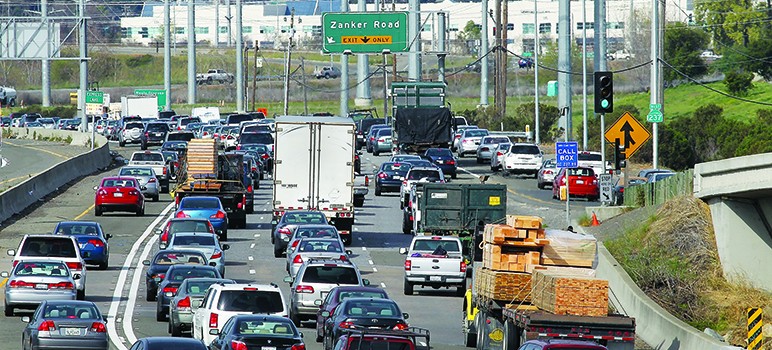California’s income from gas taxes will drop by nearly $6 billion in the next decade due to the state’s electric car rules and other climate programs, “likely resulting in a decline in highway conditions for drivers,” according to a new state analysis.
As California phases in major policies aimed at reducing greenhouse gas emissions — such as the mandates for zero-emission cars and trucks — consumers buy less gasoline and diesel, and consequently pay less taxes.
Those declines in tax dollars will be partially offset by the state’s road improvement fee, which drivers pay when they register their electric cars. But the Legislative Analyst’s Office stressed that overall the state will still see a $4.4 billion drop in funding, a 31% decline, over a decade, so the Legislature and governor must come up with substantial new funding sources.
Unless the drop is accounted for with new fees or other funding, there would be substantially less money for highway programs as well as local road maintenance, the analysts wrote. Work supporting buses, trains and other public transit options across the state also would face drops in funding.
“As the state tries to meet its ambitious climate goals through the adoption of zero emission vehicles, and greater fuel efficiency within conventional vehicles, the report finds that we’ll see a decline in fuel tax revenues,” said Frank Jimenez, a senior fiscal and policy analyst with the office.
Fuel taxes and vehicle fees fund about a third of state spending on transportation. This year’s budget, passed in June, includes about $14.2 billion in state funding for transportation.
The report projects declines of $5 billion, or 64%, in the state’s gasoline excise tax, $290 million, or 20%, in the diesel excise tax and $420 million, or 20%, in the diesel sales tax, over the next decade.
Highway maintenance is funded primarily by the fuel taxes “and therefore will face significant funding declines,” the report says. “We project funding for these programs will drop by roughly $1.5 billion (26 percent) over the next decade, from $5.7 billion to $4.2 billion.”
The state’s transportation agency, Caltrans, declined to comment.
“Caltrans is reviewing the report but does not comment on potential legislative proposals,” a spokesperson said.
Lawmakers could make up for the shortfalls in many of these programs by spending less on transportation, but that would likely mean worsening roads and highways, and also some public mass transit cuts. They might also consider further increasing gas taxes or vehicle fees. But that might have an outsized impact on the state’s lower-income communities, who are expected to adopt zero-emission vehicles more slowly as middle- or higher-income Californians.
Lawmakers also could consider using other state funds for transportation or implementing a road charge, which would tax people based on the number of miles they drive.
The report comes as California is bracing for a projected $68 billion budget deficit next year. Gov. Gavin Newsom’s Finance Department has ordered departments and agencies across government to reign in spending on everything from travel to office supplies.
California aims to reduce its greenhouse gas emissions by 85% below 1990 levels by 2045, when the state is expected to reach a statewide goal of net zero emissions. One of the most prominent ways the state is doing that is by banning the sale of all new gas-powered cars by 2035.
Alejandro Lazo is a reporter with CalMatters.


Due to the weight of the batteries EVs are considerably heavier, causing significantly more stress and damage to roads than traditional ICE vehicles do as well.
Yes, the all stars forgot the gas tax paid for many critical infrastructure projects – and with the giant and shortsighted push to get people to drive EVs, that means billions less will be available to repair already poorly maintained roadways. How will they offset this loss? Start to charge EV stations and raise taxes on everyone to continue bankrolling what will become a failed industry (EVs). It’s sad many of us with much less money have to pay into this EV system that is terrible for the environment on its current form. Reliant on China – and no real way to recycle/reuse these giant car batteries.
This should not be a surprise to anyone, even in government, by now, shouldn’t have been to anyone from the start. Also no surprise and obvious is that states, including California where EV use is more prevalent than elsewhere, will need to charge taxes for EV charging, which at least will be applied to DC (fast) or Level 3 chargers and also affect public Level 1s or 2s. It’s more difficult to tax charging at home, by those who charge at home on 120 volt or 240 volt Level 1 or 2 household chargers that are simply using more household wiring and circuits usually for Level 2, and more household power consumption. Requiring certain charging connectors like the current US standards or the increasingly known and popular Tesla alternative design is not a solution since ordinary circuits only need be fitted with the correct socket. Requiring separate circuits and physical chargers, if not separate services(!), even for Level 1 as well as Level 2 for tax purposes (or a separate service that can supply all charging in the home) is the solution, but unwieldy and subject to evasion. The obvious privilege already with expensive vehicles make more appearance here, perhaps accompanied by a sense of entitlement with incentives to switch to or support use of EVs (and outrage at their removal as well as at being taxed) and bitter contempt for taxing home charging, and willingness to evade it, would result in more trouble with tax “remedies” for EV switching losses.
baaaaaaaaaaaahahahahahahaha
and they ain’t even green, unless you call green green in Elon’s pocket
baaaaaaaaaaaahahahahahahaha
baaaaaaaaaaaahahahahahahaha
baaaaaaaaaaaahahahahahahaha